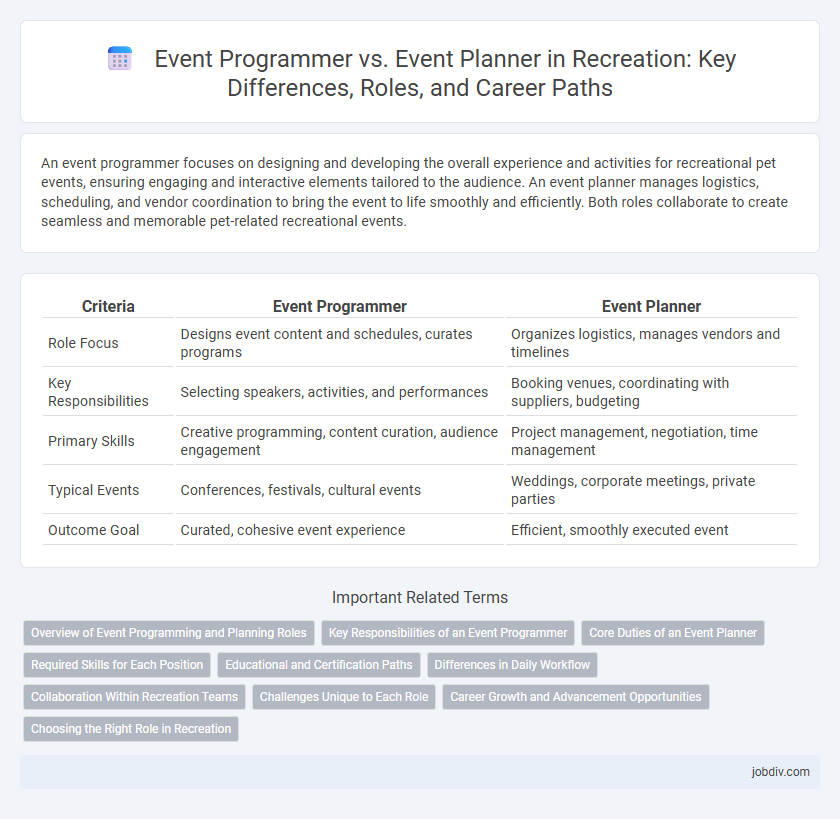An event programmer focuses on designing and developing the overall experience and activities for recreational pet events, ensuring engaging and interactive elements tailored to the audience. An event planner manages logistics, scheduling, and vendor coordination to bring the event to life smoothly and efficiently. Both roles collaborate to create seamless and memorable pet-related recreational events.
Table of Comparison
| Criteria | Event Programmer | Event Planner |
|---|---|---|
| Role Focus | Designs event content and schedules, curates programs | Organizes logistics, manages vendors and timelines |
| Key Responsibilities | Selecting speakers, activities, and performances | Booking venues, coordinating with suppliers, budgeting |
| Primary Skills | Creative programming, content curation, audience engagement | Project management, negotiation, time management |
| Typical Events | Conferences, festivals, cultural events | Weddings, corporate meetings, private parties |
| Outcome Goal | Curated, cohesive event experience | Efficient, smoothly executed event |
Overview of Event Programming and Planning Roles
Event programmers design the overall experience by curating themes, schedules, and activities tailored to target audiences, focusing on content and engagement. Event planners manage logistical details such as venue selection, vendor coordination, budgeting, and timelines to ensure smooth execution. Both roles collaborate closely to create successful recreational events, balancing creative vision with practical implementation.
Key Responsibilities of an Event Programmer
An Event Programmer primarily focuses on designing the event's content and schedule, ensuring activities align with the target audience's interests and the event's overall theme. Key responsibilities include selecting speakers, coordinating entertainment, and managing session timings to create an engaging and seamless experience. This role often requires collaboration with marketing and logistics teams to integrate programming elements smoothly into the broader event framework.
Core Duties of an Event Planner
An Event Planner primarily focuses on coordinating logistics, managing budgets, and securing vendors to ensure seamless execution of recreational events. They are responsible for venue selection, scheduling, and client communication to tailor events according to specific needs. Unlike Event Programmers who design event concepts and themes, Event Planners handle the detailed operational tasks that bring the event to life.
Required Skills for Each Position
Event Programmers require strong analytical skills, creativity in designing engaging activities, and expertise in understanding target audience preferences to develop comprehensive event agendas. Event Planners need exceptional organizational abilities, attention to detail, and proficiency in budgeting and vendor coordination to ensure smooth event execution. Both roles demand effective communication skills and adaptability to handle dynamic event environments successfully.
Educational and Certification Paths
Event programmers typically hold degrees in hospitality management, event management, or related fields and often pursue certifications such as the Certified Meeting Professional (CMP) to demonstrate expertise in coordinating event logistics and technology. Event planners usually have educational backgrounds in communications, marketing, or business administration and may obtain certifications like the Certified Special Events Professional (CSEP) to enhance skills in client interaction and event design. Both roles benefit from specialized training programs and continuing education to keep up with industry trends and regulations.
Differences in Daily Workflow
Event programmers focus on designing and developing the overall event concept and experience, analyzing audience engagement, and coordinating technical elements such as audiovisual setups and entertainment schedules. Event planners handle logistical details including venue selection, vendor management, budgeting, and timeline coordination to ensure smooth event execution. The daily workflow of event programmers involves creative and strategic tasks, while event planners concentrate on operational and administrative responsibilities.
Collaboration Within Recreation Teams
Event programmers and event planners collaborate closely within recreation teams to design and execute engaging activities that meet community needs. Event programmers focus on developing innovative program content and scheduling, while event planners manage logistics, permits, and vendor coordination to ensure seamless event delivery. Effective communication between these roles enhances recreational experiences and maximizes participant satisfaction.
Challenges Unique to Each Role
Event programmers face challenges in designing engaging content that aligns with audience interests and venue capabilities, requiring deep understanding of thematic relevance and timing. Event planners manage logistical complexities such as vendor coordination, budget constraints, and on-site problem solving to ensure smooth execution. Both roles demand adaptability, but programmers prioritize creative flow while planners focus on operational precision.
Career Growth and Advancement Opportunities
Event programmers oversee the creative and logistical aspects of recreational events, focusing on content and audience engagement, which can lead to specialized roles such as creative director or event innovation manager. Event planners handle the comprehensive coordination of event details, including budgeting, vendors, and timelines, positioning them for advancement into senior management or executive event operations roles. Both career paths offer growth opportunities in event marketing, project management, and leadership within the recreation industry.
Choosing the Right Role in Recreation
Event programmers focus on designing and structuring recreation activities to create engaging experiences, emphasizing creativity and participant interaction. Event planners manage logistics, budgeting, and coordination to ensure events run smoothly and meet organizational goals. Choosing the right role depends on whether you prefer strategic program development or detailed operational management in recreational settings.
Event Programmer vs Event Planner Infographic

 jobdiv.com
jobdiv.com